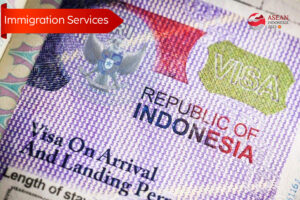Indonesia’s commitment to fostering a welcoming environment for foreign investment has led to a significant policy shift, making property ownership accessible to foreign nationals (WNA). The country now allows WNAs to own property by simply presenting a passport or visa, bringing it on par with several nations that also facilitate foreign ownership of properties within their borders.
Government Regulation No. 18 of 2021 concerning the Right to Manage, Land Rights, Flats, and Land Registration outlines the updated provisions. According to Article 69, foreign nationals are eligible to own residential properties provided they possess appropriate immigration documents, which include visas, passports, and residence permits.
The Secretary-General of the Ministry of Agrarian and Spatial Planning/National Land Agency (ATR/BPN), Suyus Windayana, emphasized the significance of this change during the ‘Socialization of Property Ownership Regulation for Foreigners’ event, stating,
“With these provisions, foreign nationals can now own property in Indonesia solely with a passport or visa, which is different from the previous requirement of a Limited Stay Permit (KITAS) or a Permanent Stay Permit (KITAP).”
This reversal in the mechanism implies that foreign nationals can obtain a KITAS or KITAP once they express their interest in investing and own or purchase property in Indonesia.
Moreover, the Government Regulation expands the scope of property ownership to include apartment units (rusun) built on Building Use Rights (HGB) land, whereas previous regulations limited foreign nationals to owning apartments on Rights of Use (Hak Pakai) land. This decision reflects Indonesia’s eagerness to encourage foreign participation in the country’s real estate sector and further boost economic growth.
Government’s Strategic Rationale for Easing WNA Property Ownership
The government’s initiative to facilitate property ownership for foreign nationals stems from several strategic reasons. Firstly, the presence of foreign nationals residing in Indonesia is expected to elevate the overall standard of living for local communities. This infusion of diversity and global perspectives has the potential to enrich and enhance the quality of life for citizens.
Furthermore, the integration of foreign nationals into the Indonesian society can foster healthy competition, raising the country’s competitiveness on the global stage. This, in turn, can drive higher living standards and improved socioeconomic conditions for the local populace.
In addition, the influx of foreign nationals can be harnessed to unleash Indonesia’s vast potential in attracting foreign investments. By offering broad market access, particularly to foreign investors, the nation can generate more job opportunities and catalyze a multiplier effect that boosts the national economy.
Notably, this policy revision is also aimed at ensuring Indonesia remains on par with other countries that have already embraced foreign property ownership, including Singapore, Malaysia, Thailand, and the United States.
Current Scenario of WNA Property Ownership
Despite the relaxation of regulations, the actual realization of property ownership by foreign nationals remains relatively low.
“Indonesia still lags significantly in terms of realizing property ownership for foreign nationals,”
Suyus Windayana emphasized during an interview in Jakarta on Thursday (3/8/2023).
Indonesia even trails its neighboring countries like Malaysia and Thailand in terms of foreign nationals’ property ownership.
As an example, in Batam, Riau Islands (Kepri), foreign nationals own around 20 properties, while the overall count of foreign nationals who possess property across Indonesia stands at approximately 36 individuals. Given that Batam, Jakarta, and Bali are attractive locations for foreign nationals, the low ownership figures indicate untapped potential.
Limitations on WNA Property Ownership
The Government’s approach to foreign property ownership strikes a balance between encouraging investments and maintaining control over the real estate sector. Article 186 of Ministerial Regulation ATR/Head of BPN No. 18 of 2021 outlines the limitations on foreign nationals’ ownership of residential properties.
To maintain prudent real estate development, the regulations impose certain restrictions on landed houses and flats (rusun) that foreign nationals can own. These include capping the land area of landed houses at 2,000 square meters per individual or family, with the requirement that these houses fall under the category of “luxury homes” as defined by prevailing laws.
As for flats, only commercial flats are available for foreign ownership, which ensures that investments align with Indonesia’s long-term economic goals.
In addition, specific minimum price thresholds for landed houses and flats have been set for purchase by foreign nationals. Ministerial Regulation ATR/Head of BPN No. 1241/SK-HK.02/IX/2022 details the guidelines on these price limits, further reinforced by the Directorate General of Land Registration and Land Rights Determination’s directives in 2022.
In Conclusion, Indonesia’s progressive steps to simplify property ownership for foreign nationals are a strategic move to attract investment, promote economic growth, and enhance the standard of living for its citizens. By fostering a conducive environment for foreign investors, the nation is aligning itself with global trends and ensuring that its real estate sector remains a driver of sustainable development and prosperity.





 20% off today. Whatsapp us!
20% off today. Whatsapp us!